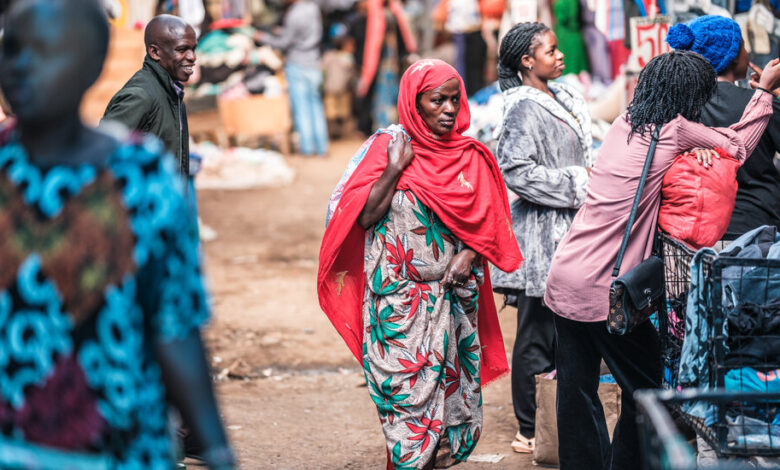‘People Who Are Salaried Are Crying’: Taxes on Workers Add to Debt Misery

The recent pay stubs reveal a stark reality for many Kenyan workers. Significant deductions are being made to cover the new funds allocated for affordable housing and health insurance in Kenya. Additionally, higher contributions to the National Social Security Fund and an increased tax rate are further reducing take-home pay for those earning a monthly salary of 45,000 shillings, equivalent to roughly $350.
In just a few months, these workers have seen their net income decrease by 9 percent, down to $262.
Here is a snapshot of a pay stub for an employee at Shining Hope for Communities, a nonprofit organization in Kenya, dated June 2024:
JUNE 2024
“People who rely on a fixed salary are feeling the pinch,” remarked Kennedy Odede, the founder of a self-help group in Nairobi’s Kibera slum.
The spike in payroll taxes is part of President William Ruto’s urgent efforts to generate revenue to sustain government operations and address Kenya’s substantial foreign debt.
Various new taxes have been introduced on items like sugar, alcohol, and plastics. Business profit taxes have doubled to 3 percent, while fees for money transfers and communication services have also escalated. Import duties, including on essential goods, have gone up to boost railway development. Exemptions for retirees have been removed, among other changes.
Tax hikes are never well-received, especially in countries like Kenya with low incomes and mounting debt. The country’s debt has soared to $80 billion due to reckless borrowing, economic setbacks from the Covid-19 pandemic, high interest rates, and inflation.
Nearly 60 percent of Kenya’s revenue is earmarked for debt repayments, a common scenario across Africa where interest payments often surpass investments in health and education.
Simultaneously, there is a pressing need for billions of dollars to fund crucial services like healthcare, education, clean water, infrastructure, and disaster relief in Kenya.
Restoring the country’s financial stability is crucial for long-term prosperity. However, Kenya faces limited options for revenue generation given that a significant portion of its population lives in poverty, and youth unemployment rates are alarmingly high.
An estimated 83 percent of Kenya’s workforce operates in the informal sector, evading taxation. This places a heavier burden on salaried individuals who contribute significantly to tax revenues.
“The increased taxes have significantly reduced our purchasing power,” remarked Elizabeth Okumu, an employee at SHOFCO, the nonprofit organization established by Mr. Odede.
Kenya’s economic turmoil has devalued the shilling against the dollar, leading to soaring import costs. A thousand shillings ($7.73) could buy essential groceries just six months ago, but now it barely covers basic items like sugar and flour, according to Ms. Okumu.
Tax proposals last year triggered violent protests in Nairobi, resulting in casualties and property damage. While the government initially rolled back some taxes in response, many were later reintroduced.
The government is currently in discussions with the International Monetary Fund for a new loan package, likely contingent on stringent fiscal reforms. However, skepticism prevails regarding the government’s capacity to repay debts or deliver essential services.
Regular audits by the country’s auditor general, Nancy Gathungu, have exposed widespread corruption and mismanagement. Reports revealed unaccounted funds earmarked for debt payments and undelivered government-funded Covid-19 vaccines, among other financial irregularities.
“Ruto emphasizes debt repayment, yet essential services are lacking,” lamented Tatiana Gicheru, a student at Strathmore University. The absence of adequate public services raises questions about the government’s priorities and accountability.
Ms. Gicheru and her friend Jewel Ndung’u expressed frustration over the limited job opportunities and deteriorating public services in Kenya. They highlighted the need for transparency in debt repayment, suggesting alternative fundraising methods to bypass government inefficiencies.
As discontent grows over rising taxes and inadequate services, Kenyans are demanding accountability and tangible improvements in governance.
Kibera, Africa’s largest urban slum located in Nairobi, exemplifies the challenges faced by marginalized communities. The lack of basic amenities, coupled with economic hardships, underscores the urgent need for comprehensive reforms and sustainable solutions.
Benedict Musyoka, a community organizer in Kibera, emphasized the struggles of young individuals in securing stable employment and supporting their families amidst economic uncertainties.
Addressing Kenya’s debt burden requires strategic interventions to broaden the tax base and minimize exemptions. Balancing fiscal priorities while meeting public demands for improved services remains a delicate challenge.
With taxes accounting for 16.6 percent of Kenya’s GDP in 2022, the country faces tough decisions ahead to navigate its financial crisis. Commemorative events and potential protests loom in June as the government finalizes its budget, likely including additional tax adjustments.
Many Kenyans, like Ms. Okumu, fear a repeat of past riots as economic hardships persist, leaving them yearning for brighter prospects in an uncertain future.
“The future seems bleak,” concluded Ms. Okumu, echoing the sentiments of many disillusioned Kenyan citizens.
Abdi Latif Dahir contributed to this report.





